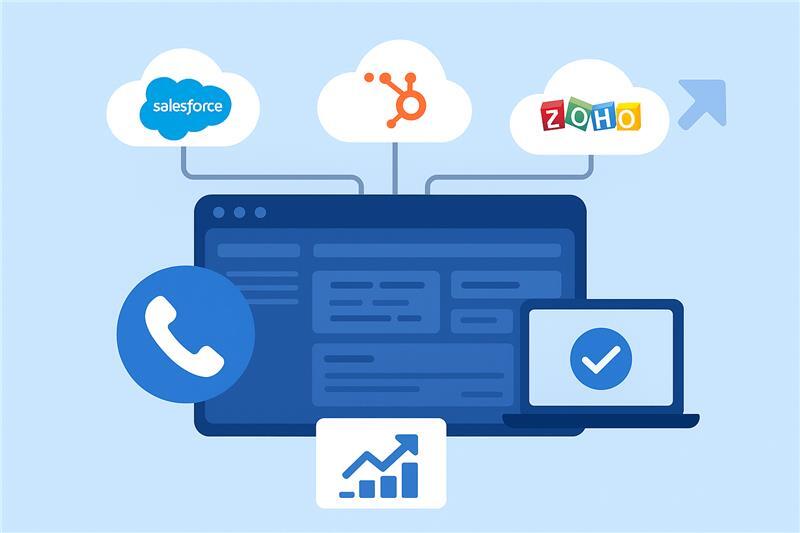
Top 7 Challenges Faced by RevOps (Revenue Operations) Teams & How Revenue Intelligence Solves Them
A lot of companies are stuck in a maze of disjointed strategies and siloed departments across their sales, marketing, and customer success teams.
Yet, they’re all on the same quest: closing deals faster, launching killer marketing campaigns, and keeping their customers happy.
Enter RevOps, the function that unites go-to-market teams and powers up their success.
According to the Boston Consulting Group, companies that level up with revenue operations see a 10-20% boost in seller productivity.
With revenue operations and revenue intelligence solutions in place companies can expect:
- More accurate forecasts
- Improvement in win/loss rates
- Higher revenue growth
- Increase in net-dollar retention

What is Revenue Operations and the Benefits of implementing RevOps Solutions?
Revenue Operations (RevOps) is a strategy that leverages revenue intelligence and AI to integrate sales, marketing, customer service, and customer success. Traditional methods of generating predictable growth are losing effectiveness, which is why RevOps, driven by advanced revenue intelligence AI, is on the rise.
By implementing seamless RevOps solutions and also revenue intelligence solutions, companies benefit from increased revenue growth, higher performance, improved productivity, and enhanced alignment with business objectives.
Do Challenges Exist?
Absolutely! While implementing key performance indicators (KPIs) can be advantageous, it also brings challenges for revenue leaders.
In today's fast-paced market, planning and execution can feel like navigating a high-stakes obstacle course.
Below, we explore the common challenges faced by RevOps leaders. Remember, this list isn’t exhaustive – every company has its own unique set of twists and turns.
Revenue Intelligence and Operations: Addressing Key Challenges
Revenue operations (RevOps) is an organizational approach designed to maximize revenue and growth potential. This methodology has been increasingly adopted by B2B companies. As of 2024, 48% of companies now have a RevOps function, which is a 15% increase from the previous year. Additionally, Gartner predicts that 75% of the highest growth companies will deploy a RevOps model by 2025.
Despite its growing popularity, adopting a RevOps framework can be challenging. To fully harness revenue intelligence AI and drive growth, organizations must overcome common obstacles in their RevOps strategy.
Challenge #1: Fragmented Data & Workflow
Effective revenue operations thrive on high-quality, centralized data. Imagine your data scattered like puzzle pieces – disorganized, inaccessible, or fragmented across various apps. This chaos can block data-driven decisions and derail your revenue goals. To keep things running smoothly, you need accurate, centralized data storage and clear data management processes.
Possible Solutions:
- Streamline data management through automation for more organized systems
- Educate team members on effective data collection, management, and analysis
- Partner with customer-facing teams to develop detailed guides and workflows
- Consistently clean and refresh data, including processes like matching, normalization, and deduplication
- Improve customer data by integrating information from third-party sources
- Set up workflows for collecting and accessing data throughout the customer journey
- Make sure data remains current and accessible to all teams involved in revenue generation
Does your RevOps team struggle with data silos? Discover how Revenue Intelligence can bridge the gap and drive growth. Request a demo today.
Challenge #2: Lacking Alignment Between Sales, Marketing, & Customer Success
When sales, marketing, and customer success teams are working with fragmented processes, workflows, and data, it can put the brakes on revenue opportunities and valuable customer insights. But when these teams sync up around common revenue goals, it boosts collaboration and efficiency, turning those missed chances into big wins!
Possible Solutions:
- Bring team members from different departments together and integrate them
- Encourage participation from various departments in meetings
- Facilitate natural conversations by placing teams in close proximity
- Seek executive backing to support a unified company culture
- Set shared revenue goals for all teams
- Promote team building to enhance trust and communication
- Ensure everyone works with a centralized dataset
- Develop a cohesive customer journey to maintain a consistent brand voice and smooth lead transitions
Does your RevOps team struggle with fragmented workflows? Discover how Revenue Intelligence can bridge the gap and drive growth. Request a demo today.
Challenge #3: Scaling & Streamlining Your RevOps Strategy
As your business booms, your RevOps game needs to level up too! Smoothing out and fine-tuning your RevOps setup is crucial for boosting customer satisfaction, slashing inefficiencies, and turbocharging revenue. How you scale hinges on where your company's at and what tools you've got in your kit.
Possible Solutions:
- Keep your RevOps strategy fresh with regular reviews and updates
- Consult revenue-generating departments for valuable inputs
- Boost efficiency through automation wherever possible
- Standardize workflows within teams and across departments
- Implement robust data management practices
- Gain executive backing for your RevOps strategy
- Explore outsourcing RevOps to seasoned teams for expertise and efficiency gains
Challenge #4: Integrating & Adopting Technology
B2B companies sometimes juggle a mishmash of tech tools. A top-notch RevOps tech setup blends specialized software with team-specific tools that go well together. Getting everyone on board with a unified tech setup might shake things up, but it's key for steady revenue growth down the road!
Salesken's Revenue Intelligence AI is a must have for RevOps. It integrates with the organization's tech stack to deliver revenue insights that a CRM alone cannot provide.
Possible Solutions:
- Perform a technology assessment
- Identify essential tools as top priorities
- Educate team members on using platforms effectively
- Monitor technology usage to remove redundant tools
- Integrate tools across departments seamlessly
- Invest in technology that enhances RevOps workflows
- Simplify your tech stack where feasible
- Centralize customer data on a unified platform
.png)
Challenge #5: Measuring & Analyzing Revenue Performance
Keeping tabs on your RevOps strategy is crucial for success. Metrics like conversion rates and customer lifetime value give you the scoop on how your revenue's doing and where you can hit it out of the park.
Possible Solutions:
- Establish KPIs to measure revenue performance effectively
- Define metrics that span the entire customer lifecycle
- Gather and analyze performance data from various departments
- Share insights with teams responsible for generating revenue
- Structure your tech stack to gain a clear understanding of customer data
- Identify and track sources of revenue accurately
Navigating revenue operations in B2B SaaS is like mastering a high-stakes game: it's intricate and always changing. You've got to keep adapting, aligning, and balancing big-picture trends with nitty-gritty metrics. But fear not! With savvy strategies and a can-do attitude, these RevOps hurdles can become your springboard to growth. In this fast-paced arena, it's the companies with top-notch RevOps finesse that stand tall and shine bright.
Does your RevOps team struggle with analysing and optimizing for performance? Discover how Revenue Intelligence can bridge the gap and drive growth. Request a demo today.
FAQ
Q1: What is the difference between Revenue Operations and Revenue Intelligence?
A1: Revenue Operations (RevOps) focuses on aligning sales, marketing, and customer success to drive revenue growth. Revenue Intelligence uses AI and data insights to support RevOps by providing real-time visibility into revenue metrics and performance.
Q2: How can Revenue Intelligence improve RevOps performance?A2: By using AI-driven insights, Revenue Intelligence helps RevOps teams make informed decisions, eliminate data silos, and optimize sales strategies.

.png)

